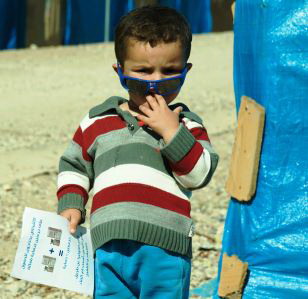 Baghdad, 12 November 2015 – This week, the Government of Iraq, with the support of WHO and UNICEF, completed the first round of the oral cholera vaccination campaign. The campaign has vaccinated 91% of the targeted population of 255 000 Syrian refugees and internally displaced Iraqis across 62 refugee and internally displaced persons camps in 13 governorates. The turnout was very high with no refusals or concerns raised regarding the vaccine. A second round will begin in December to administer a second dose to ensure protection against cholera for 5 years or more.
Baghdad, 12 November 2015 – This week, the Government of Iraq, with the support of WHO and UNICEF, completed the first round of the oral cholera vaccination campaign. The campaign has vaccinated 91% of the targeted population of 255 000 Syrian refugees and internally displaced Iraqis across 62 refugee and internally displaced persons camps in 13 governorates. The turnout was very high with no refusals or concerns raised regarding the vaccine. A second round will begin in December to administer a second dose to ensure protection against cholera for 5 years or more.
Oral cholera vaccination campaign
The OCV campaign was discussed and agreed by stakeholders in September 2015. This was followed by planning and training sessions for governorate-level managers of the Expanded Programme on Immunization in Baghdad on 26 and 27 October. On 28 October, training was provided to 1302 vaccinators and 651 social mobilizers in preparation for the first round of the mass vaccination campaign.
The Shanchol vaccine used in the campaign is a WHO prequalified vaccine. To achieve the required protection among high-risk groups, 2 doses of OCV Shanchol vaccine will be administered at an interval of 2 to 6 weeks.
The first round of the campaign, lasting 5 days, began on 31 October and the second round is due to take place in early December 2015. The administration of a second dose is needed to extend the duration of protection for 5 years or more. The vaccine is being administered to all persons over one year of age living in the target camps.
Cholera vaccination is an additional preventive measure that supplements but does not replace other traditional cholera control measures. “We need to intensify health promotion and education activities to help communities protect themselves and their families from cholera and other communicable diseases,” said acting WHO Representative Altaf Musani.
Intensive social mobilization and advocacy campaigns are being undertaken, including the nationwide dissemination of information on safe water and good sanitation and hygiene. Messages are being disseminated through electronic media, social media, mobile phones and mobile vans.
The campaign started on 31 October in 7 of the 13 governorates, followed by 4 more on 2 November (Dohuk, Sulaymaniyah, Erbil and Diyala), one on 3 November (Kirkuk) and one on 4 November (Anbar). Heavy rains, flooding and insecurity have delayed the completion of the vaccination campaign in most governorates in the central and southern parts of Iraq.
The Ministry of Health is leading the emergency response to curb the outbreak with technical support from the Cholera Task Force. In addition to advocacy efforts, the response focuses on supporting water, sanitation, and hygiene activities through monitoring of water quality and ensuring access to safe water inside health facilities and waste management at cholera treatment centres.
Staff from WHO, UNICEF and health cluster partners have been deployed to carry out the monitoring, evaluation and documentation of best practices in the introduction of the OCV in Iraq. They have also facilitated campaign logistics and preparation in selected locations to ensure that as many people as possible are protected.
Related links
Prevention and control of cholera outbreaks: WHO policy and recommendations
For more information, please contact:
Ms Rana Sidani
Senior Communication Officer
WHO Regional Office for the Eastern Mediterranean
Direct: +20 2 22765552
Mobile: +20 1099756506
E-mail:
Ms Rosane Lopes
Communications Officer
WHO Iraq country office
Mobile: +964 7809 288 614
E-mail:


